South Africa Football from A to Z
All you need to know about soccer in South Africa
Our South Africa football A to Z will be an eye-opener for all who want to know more about the beautiful game in South Africa. Here you will find our soccer alphabet with interesting facts and typical South African Terms.
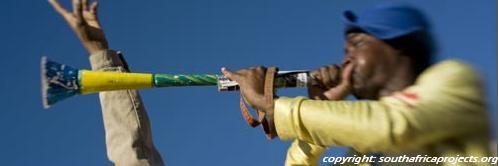
South African soccer terms
A stands for Ajax: Ajax Cape Town is Cape Town’s own premier soccer league team. Cape Town Stadium is the home ground for this Cape Town soccer club whose nickname is "Urban Warriors". They have a couple of international players in their midst, among them Anssi Jaakkola, Finland.
B for Bafana Bafana and Banyana Banyana: South Africa’s National football teams. 'Bafana' means 'The Boys' in Zulu, while 'Banyana' means 'Girls'. The men had their first worldcup appearance in 1998, never went beyond the first round in the recent worldcups but surprised with 4th place in the Confederations Cup 2009. At the AFCON 2015, they qualified, but were last of their group and did not reach the quarter-finals.
C for Confederations Cup: Even though no game of the Confederations Cup 2009 was played in Cape Town, The Confed Cup acted as a good test for the 2010 Worldcup. The South African National Football Team managed to play in the semi-finals and had lots of support from cheerful South African Fans.
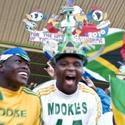
D for Diski: Township slang (Tsotsi Taal) for 'soccer'. In South Africa, there was a typical 'diski dance' created for the 2010 world cup. Have a look at the typical 'soccer moves' which are incorporated in this dance. Really funny to learn this group dance, I am sure it will resurface during the next world cup again, or when the South African men's and women's football teams take part in the Rio Olympics 2016. More about the diski dance moves here.
E for Equipment: shopping for sports gear in Cape Town is very popular with tourist and expats. Great sports equipment is much cheaper than overseas and you will find a huge variety not only of South Africa football equipment easily at the major sports retailers. Try one of the many Sports stores in Cape Town’s big shopping centers or check out Sportsmans Warehouse, South Africa’s biggest sports equipment stores.
F for Fanparks: The main fan parks for South Africa football matches are the Cape Town stadium, Durban's Mabhida stadium and Johannesburg's Soccer City stadium. At prominent matches there are further fan parks staged various cities. Many restaurants in the country stream popular matches on screens for their patrons. F also stands for 'Fanmile', a stretch of road which links Cape Town's CBD with the stadium in Greenpoint. At popular events, there are street vendors and entertainers lining the fan mile. Read more about Soccer in Cape Town and the major fan mile here.
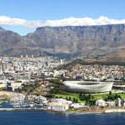
G for Greenpoint Stadium, now renamed 'Cape Town Stadium'. One of South Africa’s 2010 world cup stadiums. At the stadium in Greenpoint you can join tours of the stadium and many local events and expos are hosted in the stadium every month. The most prominent expos are held here for the annual Cape Town cycle race and the various Cape Town marathon, duathlon, triathlon. More about the stadium
H for Helplines for Emergencies: Note down these numbers for any emergency: Police 10111, Ambulance 10177, Cellphone Emergency Number 112. Find more emergency numbers here.
I for Information Centers: The South African stadiums all have help desks should you need any advice, if you have lost some items or find yourself in an emergency situation. Make sure to check for the info desks and emergency exits whenever you visit a stadium event.
J for Jobs for Volonteers: People from all over the world can apply for volunteer jobs in Cape Town South Africa for 2010. Apply at FIFA or try to get volunteer jobs at the sponsors of the Worldcup, like Sony, adidas, Coca Cola etc.
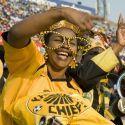
K for Kaizer Chiefs: The most popular and successful South African team from Tshwane (Pretoria) was founded by former South African football player Kaizer Motaung who went to become a famous player in the US in the late 1960s before his return back home to South Africa. The Kaizer Chiefs have many supporters all over the country.
L for Laduma: meaning 'it thunders' in the Zulu language. You can hear the fans shout 'Laduuuuuma' when a goal was scored!
M for More than Just a Game: South Africa Football Film by South African Producer Anant Singh which shows the involvement of the organized soccer in Apartheid times. It tells the story of five Robben Island Prisoners who were held there as political activists during Apartheid. It shows their commitment, discipline and creativity to play to strict rules and the formation of the Makana Football Association (MFA) which recently got a honorary membership awarded by the FIFA. More info, photo gallery and trailer here.
N for Nedbank Cup: Annual knock-out tournament of the South Africa Premier League. The tournament includes the 16 premier league teams, 8 national first division teams and 8 amateur teams. The winner of the tournament receives a R6million and qualifies for the next Confederations Cup season.
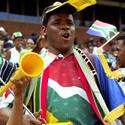
O for Opening Matches 2010 Worldcup: Cape Town and Johannesburg hosted the first two Worldcup Matches 2010 on June 11, 2010. The 2010 Opening Ceremony was held in Johannesburg at the newly build Soccer City stadium, which is nicknamed 'The African Pot'. Find great pictures of this great South Africa football stadium here.
P for Premier Soccer League: The 16 best South African Football teams are playing in the PSL. The champions for the last two seasons in South African football was SuperSport United Football Club of Pretoria. The South African PSL season lasts from August until February. Get the most recent fixtures and results as well as info about live coverage here.
More South Africa Football Terms
Q - Z
Q for Quizzes and up-to-date soccer news: Learn more about South African soccer, when reading South Africa's biggest and most popular soccer specialist website and magazine 'Soccerladuma'. Visit the website here.
R for Radebe or better Lucas Radebe: South Africa Football's most famous soccer player Lucas Radebe will be South Africa’s Tourism Ambassador 2010. Radebe who played also for Englands Premier League Club Leeds United from 1998-2002 retired from playing professional soccer in 2005.
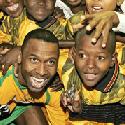
S for Soccer in Cape Town: Ajax and Santos or Engen Santos Football Club are the two most prominent soccer teams in Cape Town: Santos’ nickname is "The People’s Team". The last time they won the South African PL championships was in 2002. Soccer is with Rugby and Cricket the most popular sport with the Capetonians. Read more about Soccer in Cape Town.
T for Tickets: Book your tickets for the most popular soccer matches in South Africa online at computicket here.
U for Uniforms: Shopping for your favourite team's soccer shirts, jerseys, boots, replica and accessories is easy in Cape Town. There are lots of sports shops like Total Sports, Sportsmans Warehouse, Cross Trainer and many more in Cape Town’s major shopping centers. Further there is Mike's sports in Cape Town's Strand street which is one of South Africa's oldest soccer shops.
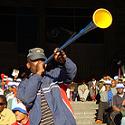
V for Vuvuzela: The typical South African trumpet which is blown at the local soccer matches. The noise upsets some visitors at the soccer matches but this is truly South African atmosphere, with singing, dancing and blowing the vuvuzela. By the way, "vuvuzela" means "making noise" in Zulu. More info here.
W for Women’s Soccer: Soccer is now being more popular with female soccer players too. In the schools football classes are taken over by girls as well and the junior teams are growing. The national women’s football team is called Banyana Banyana, which means "The Girls". In 2008 they came second in the Women’s African Football Championship.
X for Xhosa: Being one of the major languages spoken in Cape Town, Xhosa has found its way into soccer history for 2010 surely with the popular Makaraba Hat of the South African fans. Makarabas are colourfully decorated hard hats South African soccer supporters wear at matches. The word stems from the xhosa word "makarapa" which means migrant workers, i.e. countless workers with hard hats working on the construction sites. Read more on these Makaraba hats here.
Y for YouTube Videos: Watch some interesting videos about Cape Town and Soccer. Check out Youtube and click on the link here.
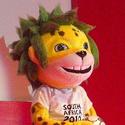
Z for Zakumi: The official Worldcup 2010 mascot is a yellow and green fellow which also shows the colours of the National Soccer Team. This is actually a yellow leopard with green hair, so a perfect camouflage on South Africas soccer pitch;) The name is combining the abbreviation for South Africa "ZA" and "kumi" which means "10" in the different South African languages.
Pictures on this page on South Africa Football, if not otherwise stated, copyright of South Africa Tourism (1), mediaclubsouthafrica (3), soschildrensvillages.co.uk (1) and flickr (1).
Go from South Africa Football to Worldcup 2010: Soccer in Cape Town
Return from South Africa Football to ExpatCapeTown Homepage